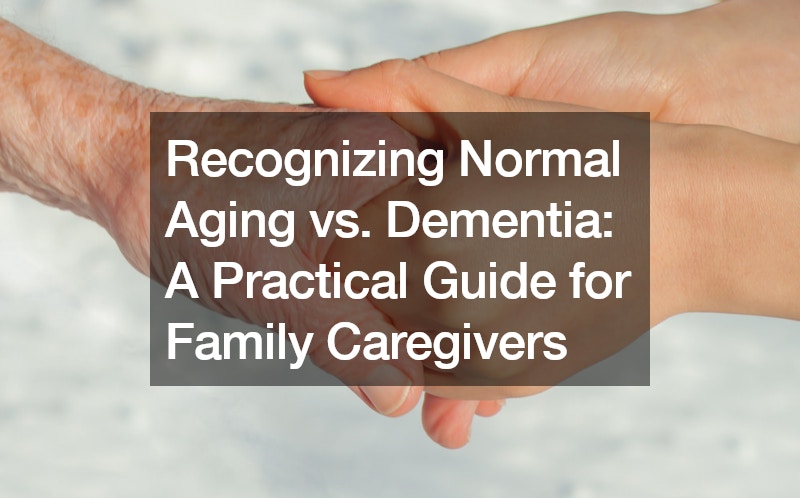As a loved one ages, it’s natural to notice changes in their memory and cognitive abilities. These changes can be concerning, especially if you’re unsure whether they’re a normal part of aging or a sign of something more serious, like dementia. This uncertainty can be a source of stress and anxiety for caregivers.
This guide will equip you with the knowledge to differentiate between normal age-related memory decline and dementia. It will also highlight the importance of seeking professional help for a proper diagnosis.
Normal Age-Related Memory Decline
Our brains, like any other part of our body, change with age. This can lead to occasional forgetfulness, especially regarding recent events. You might misplace your keys or walk into a room and forget why you went there in the first place. These experiences are common and don’t necessarily indicate dementia.
Here are some hallmarks of normal age-related memory decline:
- Occasional forgetfulness: Forgetting names, appointments, or where you placed everyday items happens to everyone sometimes.
- Difficulty remembering recent events: You might struggle to recall details from a conversation you had earlier in the day, but have a clear memory of things from your past.
- Taking longer to find words: The tip-of-the-tongue feeling, where you know the word you’re looking for but can’t quite retrieve it, is a common experience for many people as they age.
Dementia vs. Normal Aging
While occasional forgetfulness is a normal part of aging, dementia is a more significant decline in cognitive function that disrupts daily life. It’s important to note that dementia is not a disease itself, but an umbrella term for a group of conditions that cause progressive decline in memory, thinking, and reasoning. Alzheimer’s disease is the most common form of dementia.
Here’s how dementia can differ from normal age-related memory decline:
- Severity and frequency of memory lapses: Memory problems in dementia are more severe and frequent than occasional forgetfulness. They can significantly impact daily activities.
- Difficulty with familiar tasks: People with dementia may struggle with tasks they’ve done routinely for years, such as driving, managing finances, or following recipes.
- Changes in reasoning and judgment: Dementia can affect a person’s ability to make sound decisions or solve problems. They might become easily confused or show poor judgment.
- Personality and behavioral changes: Personality changes, such as increased anxiety, paranoia, or social withdrawal, can be signs of dementia.
The Dementia Continuum
Dementia typically progresses through stages, with symptoms gradually worsening over time. Here’s a brief overview of the stages:
- Mild Cognitive Impairment (MCI): This is the earliest stage, where memory problems are more noticeable than with normal aging but don’t significantly impact daily life. Symptoms may include forgetting appointments, misplacing things frequently, or having difficulty following conversations.
- Moderate Dementia: In this stage, the person requires more assistance with daily activities. They may experience increased confusion, personality changes, and difficulty managing finances.
- Severe Dementia: In the later stages, communication becomes significantly impaired, and the person may need complete dependence on a caregiver for all their needs.
The Importance of Early Diagnosis
While there’s no cure for dementia, early diagnosis is crucial. A doctor can rule out other potential causes of cognitive decline, such as vitamin deficiencies or thyroid problems. Early diagnosis also allows caregivers to plan for the future and access resources to manage the condition.
Here’s why a doctor’s visit is important:
- Accurate diagnosis: Only a doctor can definitively diagnose dementia and determine the specific type.
- Ruling out other causes: Medical conditions, medications, or even depression can mimic symptoms of dementia. A doctor can rule these out.
- Treatment options: While there’s no cure, medications can sometimes help slow the progression of dementia and manage symptoms.
- Support and resources: Early diagnosis allows caregivers to connect with support groups, learn about available resources, and plan for the future.
Tips for Caregivers
If you’re caring for a loved one with dementia, here are some tips to help you manage the challenges:
- Educate yourself: Learn as much as you can about dementia and the specific type your loved one has.
- Join a support group: Connecting with other caregivers can provide invaluable emotional support and practical advice.
- Seek professional help: Don’t hesitate to reach out to doctors, social workers, or therapists for guidance.
- Take care of yourself: Caring for someone with dementia can be emotionally and physically draining. Make sure to prioritize your own well-being.
Conclusion
Recognizing the difference between normal age-related memory decline and dementia can be challenging. By understanding the hallmarks of each and seeking professional help, caregivers can be better equipped to support their loved ones.
.

